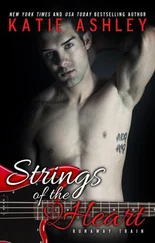This child, when it was born, would have his name.
And if she said it, by the state of California, it was true. That was the miraculous thing she was learning, that the power to say something with conviction, with grace and beauty, made a story that felt as real as whatever might have been the truth, that these were equal forces in the world, just as powerful as records, maybe even more so. Memory, love, pain: these were the things that people believed. These were the things that made her believe herself. And now if she wanted Tim’s child, this was how she was going to get it, and this had always been how she was going to get it, by saying so.
He had been dead for almost two years, the trunk of ampoules beneath her bed long emptied, despite her half doses, her stretch and pull. In the end, there had been no lying about it. Tim watched her with the last needle in her hand.
“So that’s it,” he said, and she said yes.
She’d turned from him and slipped her dress over her head, a gesture she’d made a thousand times in their life together and yet one that always felt filled with anticipation, his first light touch, the way they always began, and she lay down beside him in the heat and waited.
They looked out over the desert, the blistered sunset. He had a gun; he’d asked her to hide it, but what was a hiding place between them? The night came on, the sounds in the darkness, and she tried to listen only to that, not what she knew would come, but only Tim now, his arms wrapped around her, their lengths pressed together on the bed, and night in the desert beyond.
The sound of the shot, all the way out in the canyon, woke her at dawn.
The tightrope of his pain had required all their time and concentration. They had carved themselves away from everyone to manage it; she wrote to read to him, she cooked to feed him, she lived way out there in the desert to pour herself into him, and now he’d left her. It was a long time before she found a reason to continue on.
Her hand dropped along the dark seam of her belly and disappeared in her lap. She had six more weeks to go. Sometimes it felt as though the parts of her she couldn’t see would never return to her, that she would have to learn to live without her feet, the thatch of hair around her sex. She hadn’t thought about sex in years, though she’d had plenty of it. She hadn’t thought about sex since she stopped having it with Tim.
She was hungry. She ate tiny meals these days, craved lemony things, and spicy things, and beer, which Bieler had said was good for the production of milk. She wouldn’t nurse this baby, though, no matter what Dr. Bieler wanted. Because this baby had been adopted; that was what she planned to say. Until the day she died, that was what she planned to say.
She stood slowly from her chair, the full arc of her form pulling her forward. She needed to move. She stacked her pages and flipped the coverlet up over her pillow, drew a smock over her head. She wanted nothing against her skin these days and dressed only to leave the room, her hair pulled back tightly, her sunglasses and a bright slash of lipstick. She would be back in twenty minutes, but leaving felt as if she’d peeled herself from the cocoon.
Heat shimmered on the asphalt. Sweat ran from her scalp, the backs of her legs, places she had not known sweat was made, and she walked slowly so as not to melt away. Back in her rooms, she would fill the basin with tepid water and sponge herself off, she would wash her hair and let it dry across her pillow as she took a nap, and so dreamily she stepped into the grocers’ on the corner, the fan pitched down hard from the ceiling, blowing its hot breeze against her skin. She collected a bagful of small yellow tomatoes and a carton of blackberries, a loaf of semolina bread, some soft white cheese. She pulled two bottles of soda from the cooler and a chocolate bar: she’d had a sweet tooth and saw no reason not to satisfy it.
The cashier loaded her brown paper bag, and Mary Frances slipped her sunglasses off the crown of her head, stepped back through the fan and into heat of the day.
She was waiting for the light to change on the corner, of all things innocuous and simple, of all things daily, she was waiting for the light to change when someone touched her shoulder.
Even before she turned around, she felt as if she were falling, her getaway disappearing. This was it. It was all over. She’d been found out.
“Mary Frances.”
It was her sister, Anne.
In a single motion, they both reached for her belly, high and firm and real, steadying themselves against it. Anne’s face was pale, round-mouthed, and Mary Frances could not help but laugh.
“Dote,” Anne said. “Jesus Christ, are you all right?”
She couldn’t get a breath, the baby high and tight in her rib cage, and the laughing that was both nervous and true. She thought of little Anne, years ago in her pinafore, her mouth on fire, her sister, the only person who might and might not understand what she was doing, her toughest audience, her first. How could she explain?
Anne had her by the elbow. She was headed for a park bench.
“Shhh,” she said. “We’ll sit down, Dote. What on earth has happened? What is going on?”
“Oh, Anne,” she said, still laughing. “Where do I begin?”
This book was written over the better part of a decade, with the support of so many good people to whom I will always be grateful.
It began with about two dozen pages of Joan Reardon’s luminous biography, Poet of the Appetites: The Lives and Loves of M.F.K. Fisher . That biography, read and read again, sent me to Fisher’s body of work, her letters and published journals, and late in the game, to Anne Zimmerman’s An Extravagant Hunger: The Passionate Years of M.F.K. Fisher, all of which provided insight, friction, and answers to questions I had not even thought to ask about a charming, enigmatic, and brilliant woman.
I would like to thank the National Endowment of the Arts, Queens University of Charlotte, the South Carolina Governor’s School for the Arts and Humanities, edible Upcountry magazine, and M. Judson Booksellers and Storytellers, as well as the management and staff at Ballcrank Industries — namely Carla Damron, Stephen J. Eaonnou, Dartinia Hull, Beth Johnson, and Holly Pettman — without whom I would quite literally be lost.
Writers I admire greatly read this book in manuscript and provided invaluable feedback and care. Thank you to Lauren Groff, Jo Hackl, Fred Leebron, Mamie Morgan and Jim Walke.
Thank you to Kathryn Court and Lindsey Schwoeri at Viking for sharp and sensitive editorial skill, and to the incredible Marly Rusoff, for putting me in their hands.
Thank you to Ron Friis, who always thought this would be a good book.
Thank you to my family. And to my children, who mean everything.












